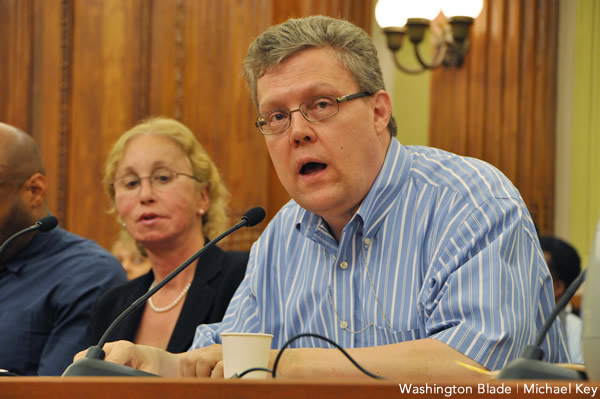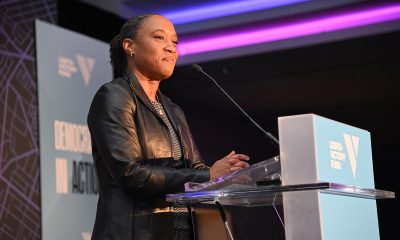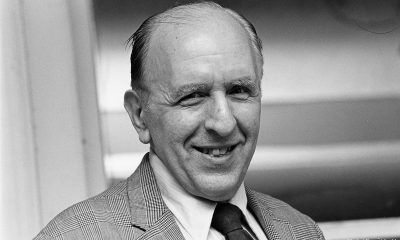Local
Third activist released from Kameny lawsuit
Attorneys for estate say picket signs, other property still missing


Gay activist, Richard Rosendall, has been released from the Kameny estate lawsuit. (Washington Blade file photo by Michael Key)
Gay activist Richard Rosendall, a longtime friend of the late gay rights leader Frank Kameny, testified in court on May 11 that he has returned several items he “borrowed” from Kameny’s house shortly after Kameny died last October.
Rosendall appeared in a courtroom at the D.C. Superior Court’s Probate Division in response to a show cause order obtained by attorneys representing Timothy Clark, the personal representative and main heir of Kameny’s estate.
Through his attorneys, Clark has charged in a lawsuit that Rosendall and three other Kameny friends and associates removed without permission documents and other property belonging to the Kameny estate from Kameny’s house in Northwest Washington shortly after Kameny died last Oct. 11.
“After the death of Franklin Edward Kameny, I borrowed, and held in my possession and control, certain personal properly lawfully belonging to the Estate of Franklin Edward Kameny,” Rosendall stated in a sworn affidavit submitted to the court two days prior to the hearing.
He identified in the affidavit and on the witness stand the items borrowed as “a copy of Dr. Kameny’s 1961 brief for the Supreme Court of the United States; a letter to or from [U.S. Supreme Court] Justice [Lewis] Powell; several letters between Dr. Kameny and an Army official concerning [the Gay and Lesbian Activists Alliance’s] wreath-laying ceremonies at Arlington Cemetery; a box of business cards; and three or four books.”
Two of the other three named in the lawsuit, Charles Francis and Bob Witeck, have returned items they acknowledged belonging to the estate. Rosendall testified at the May 11 hearing that he helped Francis carry 17 boxes filled with papers and other items from Kameny’s house, which he said Francis placed in a storage facility for safekeeping. Rosendall has said Clark, who lived in the house with Kameny for 19 years, gave them permission to enter the house.
Upon their return of the property last month, attorneys for the estate dismissed Francis and Witeck from the lawsuit.
Similar to Rosendall, Francis and Witeck have said they took possession of the items to ensure they remain safe and properly preserved during a period of confusion following Kameny’s death. Each has said they planned all along to return the items to the estate. Witeck has said the only items he took were several photographs.
Rosendall testified that he returned the items he borrowed to Francis, who returned them to the Kameny estate last month.
“The Estate of Dr. Franklin E. Kameny is satisfied that Richard J. Rosendall has returned the items that Mr. Rosendall removed from Dr. Kameny’s home shortly after Dr. Kameny’s death,” said Glen Ackerman, one of the attorneys representing Clark and the Kameny estate, in a statement to the Blade on Monday.
“However, there are still a number of important historical items still missing from the Estate, including Dr. Kameny’s collection of buttons, handmade picket signs and posters,” Ackerman said in the statement. “The Estate is attempting to recover these missing historically significant assets as a part of the probate process and to make certain that Dr. Kameny’s wishes as recorded in his Last Will and Testament are carried out fully.”
In his will, Kameny bequeathed his papers to the Library of Congress while leaving all other possessions, including his house and car, to Clark.
In response to questions at the May 11 court hearing by Kameny estate attorney J. Max Barger, Rosendall disputed claims by the estate that Clark believes as many as 100 picket signs were taken from the house after Kameny’s death. Rosendall told Barger he doubted that many picket signs had been in the house.
Kameny and his fellow gay activists used the picket signs in their historic gay rights demonstrations outside the White House and other government buildings in the early 1960s, the first such demonstrations ever held.
Barger and Ackerman told Judge John Campbell, who presided over the hearing, that the picket signs and buttons, which are inscribed with gay rights messages, have an important historic value and must be accounted for during the probate process for the estate.
Rosendall testified that he has possession of one of the picket signs, which he said Kameny gave permission for him to take several years prior to his death. He said Kameny also gave him a signed copy of The Homosexual Citizen, a publication of the Mattachine Society of Washington, which Kameny co-founded in 1961.
Mindy Daniels, Rosendall’s attorney, expressed concern during the hearing that the estate was confusing items that Kameny gave to Rosendall and others with items belonging to the estate. She noted items given away by someone prior to their death are not part of their estate after the person dies.
Ackerman told Campbell that Francis, Witeck, Rosendall and Marvin Carter, another Kameny friend, had not responded to earlier efforts by the estate to obtain from them an inventory of the items they allegedly took from Kameny’s house following Kameny’s death.
Daniels said the estate never contacted Rosendall about these items until it filed suit against him in March. Ackerman said the estate did make attempts to reach Rosendall and the other three men.
The estate named Carter as a defendant in one of the lawsuits seeking the return of items taken from Kameny’s house and petitioned the court to order him to appear at the May 11 show cause hearing, but Carter did not show up for the hearing. Barger told the court the estate wasn’t able to locate him to serve him a summons to appear at the hearing.
Carter hasn’t returned calls from the Blade seeking comment on the case. As head of the local LGBT charitable group Helping Our Brothers and Sisters (HOBS), Carter arranged for the group to provide financial assistance and support for Kameny in the last years of his life.
“I don’t know where we are going with this,” the judge told the attorneys at the hearing. “You can say to these folks give the items back,” Campbell said to Ackerman and Barger. “They can say we did. You can say they didn’t…But we’re not sitting in a criminal court. I can’t convict someone of theft.”
Campbell called on all parties in the case to cooperate and do their best to come up with an inventory of all property that belongs to the state.
He ruled that Rosendall fulfilled the requirements of the show cause order and ordered that he be released from the order. He denied a request from Ackerman and Barger that he issue a “non-disparagement” order prohibiting Rosendall from saying disparaging things about Clark or the Kameny estate. Ackerman told Campbell that an attorney representing Francis made derogatory remarks and false accusations against Clark earlier this year.
Campbell said that as a probate judge he did not have authority to issue such an order.
“I always hope that people will be civil,” he said.
The judge said he could not issue a ruling for Carter because the attorneys for the estate had not been able to serve him with a summons calling on him to appear in court.
Ackerman said the estate would file a motion to dismiss its lawsuit against Rosendall, leaving Carter as the only one of the four with the lawsuit still pending against him. The lawsuit calls on the court to require that Carter disclose what, if any, items he may have that belong to the estate and that he return any such items. Carter has yet to file a response to the lawsuit.
In his affidavit filed with the court, Rosendall, vice president for political affairs of the Gay and Lesbian Activists Alliance, made these additional assertions:
“I hereby affirm that I have destroyed or returned any and all copied, digitized, or otherwise electronically or physically duplicated property belonging to the Estate, including but not limited to: personal papers, photographs, documents, memorabilia and other miscellaneous items of tangible personal property. I further affirm that I have not caused the duplication and/or digitization, whether electronic or physical, of said property of the Estate to third parties.”
District of Columbia
Bowser budget proposal calls for $5.25 million for 2025 World Pride
AIDS office among agencies facing cuts due to revenue shortfall

D.C. Mayor Muriel Bowser’s proposed fiscal year 2025 budget includes a request for $5.25 million in funding to support the June 2025 World Pride celebration, which D.C. will host, and which is expected to bring three million or more visitors to the city.
The mayor’s proposed budget, which she presented to the D.C. Council for approval earlier this month, also calls for a 7.6 percent increase in funding for the Mayor’s Office of LGBTQ Affairs, which amounts to an increase of $132,000 and would bring the office’s total funding to $1.7 million. The office, among other things, provides grants to local organizations that provide services to the LGBTQ community.
Among the other LGBTQ-related funding requests in the mayor’s proposed budget is a call to continue the annual funding of $600,000 to provide workforce development services for transgender and gender non-conforming city residents “experiencing homelessness and housing instability.” The budget proposal also calls for a separate allocation of $600,000 in new funding to support a new Advanced Technical Center at the Whitman-Walker Health’s Max Robinson Center in Ward 8.
Among the city agencies facing funding cuts under the mayor’s proposed budget is the HIV/AIDS, Hepatitis, Sexually Transmitted Disease, and Tuberculosis Administration, known as HAHSTA, which is an arm of the D.C. Department of Health. LGBTQ and AIDS activists have said HAHSTA plays an important role in the city’s HIV prevention and support services. Observers familiar with the agency have said it recently lost federal funding, which the city would have to decide whether to replace.
“We weren’t able to cover the loss of federal funds for HAHSTA with local funds,” Japer Bowles, director of the Mayor’s Office of LGBTQ Affairs, told the Washington Blade. “But we are working with partners to identify resources to fill those funding gaps,” Bowles said.
The total proposed budget of $21 billion that Bowser submitted to the D.C. Council includes about $500 million in proposed cuts in various city programs that the mayor said was needed to offset a projected $700 million loss in revenue due, among other things, to an end in pandemic era federal funding and commercial office vacancies also brought about by the post pandemic commercial property and office changes.
Bowser’s budget proposal also includes some tax increases limited to sales and business-related taxes, including an additional fee on hotel bookings to offset the expected revenue losses. The mayor said she chose not to propose an increase in income tax or property taxes.
Earlier this year, the D.C. LGBTQ+ Budget Coalition, which consists of several local LGBTQ advocacy organizations, submitted its own fiscal year 2025 budget proposal to both Bowser and the D.C. Council. In a 14-page letter the coalition outlined in detail a wide range of funding proposals, including housing support for LGBTQ youth and LGBTQ seniors; support for LGBTQ youth homeless services; workforce and employment services for transgender and gender non-conforming residents; and harm reduction centers to address the rise in drug overdose deaths.
Another one of the coalition’s proposals is $1.5 million in city funding for the completion of the D.C. Center for the LGBTQ Community’s new building, a former warehouse building in the city’s Shaw neighborhood that is undergoing a build out and renovation to accommodate the LGBTQ Center’s plans to move in later this year. The coalition’s budget proposal also calls for an additional $300,000 in “recurring” city funding for the LGBTQ Center in subsequent years “to support ongoing operational costs and programmatic initiatives.”
Bowles noted that Bowser authorized and approved a $1 million grant for the LGBTQ Center’s new building last year but was unable to provide additional funding requested by the budget coalition for the LGBTQ Center for fiscal year 2025.
“We’re still in this with them,” Bowles said. “We’re still looking and working with them to identify funding.”
The total amount of funding that the LGBTQ+ Budget Coalition listed in its letter to the mayor and Council associated with its requests for specific LGBTQ programs comes to $43.1 million.
Heidi Ellis, who serves as coordinator of the coalition, said the coalition succeeded in getting some of its proposals included in the mayor’s budget but couldn’t immediately provide specific amounts.
“There are a couple of areas I would argue we had wins,” Ellis told the Blade. “We were able to maintain funding across different housing services, specifically around youth services that affect folks like SMYAL and Wanda Alston.” She was referring to the LGBTQ youth services group SMYAL and the LGBTQ organization Wanda Alston Foundation, which provides housing for homeless LGBTQ youth.
“We were also able to secure funding for the transgender, gender non-conforming workforce program,” she said. “We also had funding for migrant services that we’ve been advocating for and some wins on language access,” said Ellis, referring to programs assisting LGBTQ people and others who are immigrants and aren’t fluent in speaking English.
Ellis said that although the coalition’s letter sent to the mayor and Council had funding proposals that totaled $43.1 million, she said the coalition used those numbers as examples for programs and policies that it believes would be highly beneficial to those in the LGBTQ community in need.
“I would say to distill it down to just we ask for $43 million or whatever, that’s not an accurate picture of what we’re asking for,” she said. “We’re asking for major investments around a few areas – housing, healthcare, language access. And for capital investments to make sure the D.C. Center can open,” she said. “It’s not like a narrative about the dollar amounts. It’s more like where we’re trying to go.”
The Blade couldn’t’ immediately determine how much of the coalition’s funding proposals are included in the Bowser budget. The mayor’s press secretary, Daniel Gleick, told the Blade in an email that those funding levels may not have been determined by city agencies.
“As for specific funding levels for programs that may impact the LGBTQ community, such as individual health programs through the Department of Health, it is too soon in the budget process to determine potential adjustments on individual programs run though city agencies,” Gleick said.
But Bowles said several of the programs funded in the mayor’s budget proposal that are not LGBTQ specific will be supportive of LGBTQ programs. Among them, he said, is the budget’s proposal for an increase of $350,000 in funding for senior villages operated by local nonprofit organizations that help support seniors. Asked if that type of program could help LGBTQ seniors, Bowles said, “Absolutely – that’s definitely a vehicle for LGBTQ senior services.”
He said among the programs the increased funding for the mayor’s LGBTQ Affairs office will support is its ongoing cultural competency training for D.C. government employees. He said he and other office staff members conduct the trainings about LGBTQ-related issues at city departments and agencies.
Bowser herself suggested during an April 19 press conference that local businesses, including LGBTQ businesses and organizations, could benefit from a newly launched city “Pop-Up Permit Program” that greatly shortens the time it takes to open a business in vacant storefront buildings in the downtown area.
Bowser and Nina Albert, D.C. Deputy Mayor for Planning and Economic Development, suggested the new expedited city program for approving permits to open shops and small businesses in vacant storefront spaces could come into play next year when D.C. hosts World Pride, one of the word’s largest LGBTQ events.
“While we know that all special events are important, there is an especially big one coming to Washington, D.C. next year,” Bowser said at the press conference. “And to that point, we proposed a $5.25 million investment to support World Pride 2025,” she said, adding, “It’s going to be pretty great. And so, we’re already thinking about how we can include D.C. entrepreneurs, how we’re going to include artists, how we’re going to celebrate across all eight wards of our city as well,” she said.
Among those attending the press conference were officials of D.C.’s Capital Pride Alliance, which will play a lead role in organizing World Pride 2025 events.
Maryland
Health care for Marylanders with HIV is facing huge cuts this summer
Providers poised to lose three-quarters of funding

BY MEREDITH COHN | By the end of June, health care providers in Maryland will lose nearly three-quarters of the funding they use to find and treat thousands of people with HIV.
Advocates and providers say they had been warned there would be less money by the Maryland Department of Health, but were stunned at the size of the drop — from about $17.9 million this fiscal year to $5.3 million the next. The deep cuts are less than three months away.
The rest of this article can be read on the Baltimore Banner’s website.
District of Columbia
Taste of Point returns at critical time for queer students
BIPOC scholar to speak at Room & Board event on May 2

The Point Foundation will kick off May with its annual Taste of Point DC event. The event will be hosted at Room & Board on 14th Street and feature a silent auction, food tastings, a speech from a scholar, and more.
Point’s chief of staff, Kevin Wright, said that at Taste of Point, the scholars are the star of the show.
“People never come to an event to hear Point staff speak, they come to hear from the people most impacted by the program,” he said. “At its core Taste of Point is designed to center and highlight our scholars’ voices and experiences.”
This year, a Point BIPOC Scholar, Katherine Guerrero Rivera will speak at the event.
“It is a great opportunity to highlight the scholars out there on the front lines making impacts in almost every sector and job field,” Wright said.
Wright pointed out that this year especially is a pivotal time for LGBTQ students.
“In 2023, there were 20 states that passed anti-LGBTQ legislation,” he said. “By this point in [2024] we already have more.”
Wright said the impacts of those legislative attacks are far reaching and that Point is continuously monitoring the impact they have on students on the ground.
Last month, The Washington Post reported that states with anti-LGBTQ laws in place saw school hate crimes quadruple. This report came a month after a non-binary student, Nex Bennedict, died after being attacked at school.
“So, we see this as a critical moment to really step up and help students who are facing these challenges on their campus,” Wright said. “Our mission is to continue to empower our scholars to achieve their full academic and leadership potential.”
This year Point awarded nearly 600 LGBTQ students with scholarships. These include the flagship scholarship, community college scholarship and the BIPOC scholarship. When the foundation started in 2002, there were only eight scholarships awarded.
Dr. Harjant Gill is one of those scholars who said the scholarship was pivotal for him. Gill said he spent his undergraduate years creating films and doing activism for the LGBTQ community.
As a result, his academic record wasn’t stellar and although he was admitted into American University’s graduate program he had no clue how he would fund it.
Upon arrival to American he was told to apply for a Point scholarship and the rest was history.
“It ended up being the one thing that kept me going otherwise I would have dropped out,” he said. “Point was incredibly instrumental in my journey to becoming an academic and a professor.”
More than a decade later, Gill serves on the host committee for Taste of Point and is a mentor to young Point scholars. He said that he donates money yearly to Point and that when he is asked what he wants for a gift he will often tell his friends to donate too.
To attend the event on Wednesday, May 2, purchase tickets at the Point website. If you can’t attend this year’s Taste of Point DC event but would like to get involved, you can also donate online.




















